|
|
|
Sort Order |
|
|
|
Items / Page
|
|
|
|
|
|
|
| Srl | Item |
| 1 |
ID:
125232
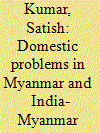

|
|
|
|
|
| Publication |
2013.
|
| Summary/Abstract |
Myanmar is opening itself to the world. Gradually, the Military 'Junta' has come to terms and decided to accommodate the democratic voices of people. But there is a long journey ahead before things can be better placed. The lengthy serpentine rule of military for more than five decades did not allow the institutions to germinate and take proper shape. It resulted in multiple vices in terms of managing a state order in a nation-state. One after the other, challenges became obnoxious in a liberal military rule.
|
|
|
|
|
|
|
|
|
|
|
|
|
|
|
|
| 2 |
ID:
117146
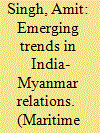

|
|
|
|
|
| Publication |
2012.
|
| Summary/Abstract |
Myanmar is an important neighbour of India as it shares extensive land borders with India's north-eastern states and maritime borders in the Bay of Bengal. The long spell of Myanmar's military rule forced India to follow a policy of disengagement with the Burmese authorities. It was only after India initiated its "Look East" policy in the 1990s New Delhi started its engagement with the military junta. Moreover, the recent democratisation of Myanmar has the potential to take India-Myanmar relations to a new height.
|
|
|
|
|
|
|
|
|
|
|
|
|
|
|
|
| 3 |
ID:
131569
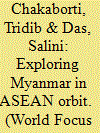

|
|
|
|
|
| Publication |
2014.
|
| Summary/Abstract |
In recent years, the changing power dynamics of the past military rulers to civilian way of functioning has raised number of questions in the discourse of international politics. This shift of power structure has evolved on account of a number of important factors; the autocratic rule of the military junta, the absence of democratic norms, violation of Human Rights, followed by under development on account of international sanctions, pressure from the Western world to follow democratic norms, the inclusion of Myanmar into ASEAN and the pressure of the latter on the former to establish democracy, remains the prime reason for the weak economic development. The shifting paradigm of military rulers to civilian government since 2011 followed by the entry of various actors like USA, India, Japan, and China shifted the entire gamut to a different direction. This article will highlight the role of ASEAN over the years with reference to Myanmar's new government and assess the implication in India.
|
|
|
|
|
|
|
|
|
|
|
|
|
|
|
|
| 4 |
ID:
125919
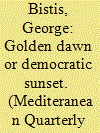

|
|
|
|
|
| Publication |
2013.
|
| Summary/Abstract |
This essay traces the history of the Far Right in Greece, which is on the rise again almost four decades after the collapse of the military junta that ruled the Mediterranean country from 1967 to 1974. The author examines how the Golden Dawn party capitalized on Greek citizens' anxieties brought about by economic crisis, illegal immigration issues, high unemployment rates, increases in crime, anti-austerity public sentiments, and the uncertainty over the country's future to become, in just a few years, a formidable political party in Greece.
|
|
|
|
|
|
|
|
|
|
|
|
|
|
|
|
| 5 |
ID:
125244
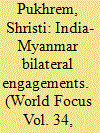

|
|
|
|
|
| Publication |
2013.
|
| Summary/Abstract |
A new world order emerged in the 1990s as the Soviet Union, India's staunchest ally, collapsed and disintegrated, and the Cold War came to an end. India felt constrained "to explore other options, both regionally and globally, in search of preserving and promoting its economic and strategic interests and there, the eastern neighbours offered a promising area of engagement" (Muni, 2011:5).
|
|
|
|
|
|
|
|
|
|
|
|
|
|
|
|
| 6 |
ID:
145449
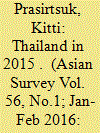

|
|
|
|
|
| Summary/Abstract |
Under the military regime, Thailand struggled to design a new constitution. As the recently drafted document was rejected, another Constitutional Drafting Committee was installed, in effect delaying the return to electoral democracy for almost a year, until mid-2017 or so. Meanwhile, a bomb blast in downtown Bangkok that killed about 20 people revealed not only the risk of international terrorism but also the dilemma of Thai foreign policy.
|
|
|
|
|
|
|
|
|
|
|
|
|
|
|
|
| 7 |
ID:
167463
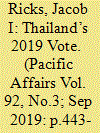

|
|
|
|
|
| Summary/Abstract |
Thailand’s March 2019 ballot was the first for the country since 2011, and for many it signaled the potential end of the military junta’s five-year rule. But was it truly a return to democracy? This essay argues that the election was far from a democratization event. Instead, it was a highly orchestrated exercise to ensure authoritarian longevity. The junta employed techniques of institutional engineering as well as managing the election’s outcomes in an effort to extend the premiership of Prayuth Chan-ocha despite increasing pressure for a return to civilian rule. The results of the election suggest that Thai society continues to exhibit deep divisions between those who support and those who oppose military interventions in politics. I further contend that the election should be seen as part of the continuing struggle by conservative forces in society to maintain their dominance in politics despite demands from other segments of the population for equal representation, a contest which is far from over.
|
|
|
|
|
|
|
|
|
|
|
|
|
|
|
|
|
|
|
|
|